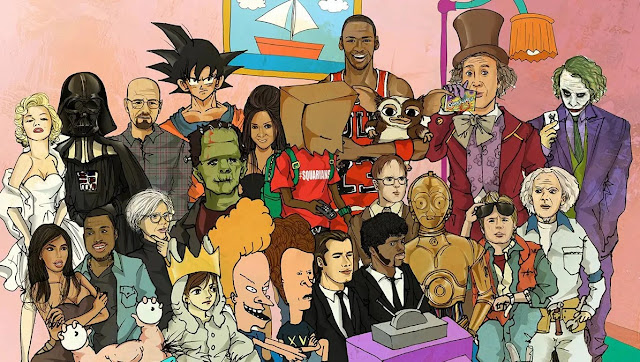To begin, let's take the words pop culture. I have always taken it as a contraction of popular culture. I know some have taken the pop to mean is is fizzy and satisfies a sweet tooth without having any real nutritional value. I reject that, because sci-fi movies (which I have never seen anyone argue not being pop culture) can have quite a bit of "nutritional value". Star Trek may not have been the most intellectual show of it's day, but it often had some moral or philosophical point to make. I also think that the context of era matters. Mozart might not be "pop" now, but he most certainly was during his lifetime. And recognizing this also shows the lie in the assertion that pop culture is disposable.
In my mind, pop culture is any artistic or commercial venture (or combination of the two) that impacts the public psyche in a way where it can be referenced and almost everyone will know what the reference means. When someone makes shrill screeching sounds while making up and down stabbing gestures with their hand, almost everyone recognizes that this is a reference to the Alfred Hitchcock movie Psycho without having to be told. And for more obscure things, not everyone will be familiar with the classic (and great) sci-fi movie Forbidden Planet, but most people with be familiar with the genre tropes of that era that originated with it. Not everyone has seen a giallo movie, but they understand the tropes that are associated with it. Not everyone listens to heavy metal music, but they grok the stereotypes of a typical Judas Priest audience. Grok, by the way, is one of those words that used to be pop culture, gaining mass acceptance from the novel that originated it, Robert Heinlein's Stranger In A Strange Land. It has since slipped from the public consciousness. Which raises the question, is it still pop culture?
I think it is. To me anything made for mass consumption is pop culture. And no matter what the John Cages and the Lou Reeds of the world may say, ultimately they are hoping that the biggest amount of people possible see/hear/appreciate/take in their work. Does this mean that basically anything made for the enjoyment of other people is pop culture? In my mind, yes. And even further. I think magazine ads and t.v. commercials are also pop culture. They are something the majority of people see and hear, and they sometimes leave a large enough impression that they become a cultural reference point. Toys are definitely pop culture, especially the mass produced ones. The implication of this is that Garbage Pail Kids The Movie is pop culture, as is The Godfather, as is Citizen Kane and The Seven Samurai. Of course that's not to say the first movie is the equal in quality of the other three, or that it had the same cultural impact. But even junk culture can have a huge impact. See how much Star Wars and Marvel Comics have changed the cultural landscape over the past few decades. By the way, I love both Star Wars and Marvel Comics, but I hardly think one can argue in good faith that they are on the same intellectual level as a novel by Leo Tolstoy, or even J.R.R. Tolkien for that matter. The same as The Ramones, whom I also love, are not on the same musical level as John Coltrane. However, in the modern musical landscape the argument could be made that the Ramones have had a more immediate and tangible influence on current music that Coltrane.
If all this seems like a lot of words to say not much of anything at all, that's what pop culture does best. It navel gazes, like Steven Spielberg writing a movie about a kid growing up who wants to be a film maker. It bloviates, like the staff writers at Rolling Stone churning out 250 words on the cultural significance of Miley Cyrus wearing a tank top to some awards show. It completely misses the point of itself, the way audiences at the time didn't care for Heathers, only for it to become one of the most influential movies of the 80's. Social media is filled with people (like me) who spend an inordinate amount of time discussing, arguing, reminiscing, and questioning the movies, music, television shows, theatrical productions, advertising campaigns, and books (comic and prose) that make up most of our leisure time enjoyment. And the great thing about that time spent dong those things is, it's all subjective. There's someone who will take umbrage at something I said here, or maybe even everything I said here. And that's okay. Their opinion is just as valid as mine. Pop culture is a buffet of entertainment. We can all take what we like, or what we need, and leave the rest. Pop culture is also prone to self grandiose phrases that don't mean as much as they might seem to on the surface, like that one.

Comments
Post a Comment